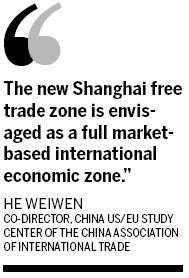


China is set to further promote economic cooperation with East Asian countries by making greater efforts to push for the establishment of multilateral free trade zones.
On Monday, the World Bank cut its economic growth forecast for 2013 and 2014 for China and most developing East Asian economies. It now estimates that developing East Asian economies will expand 7.1 percent this year and 7.2 percent in 2014, down from its April forecasts of 7.8 percent and 7.6 percent, respectively.
The bank said that developing East Asian economies are growing at a slower pace, as China shifts from an export-oriented economy and focuses on domestic demand.
However, experts said that China's domestic structural transformation and upgrading process will promote multilateral cooperation and boost the economies of the East Asian bloc.
In the China (Shanghai) Pilot Free Trade Zone - approved by the State Council two months ago and officially launched in late September - an important developing strategy is to explore establishing a trading and resource-allocation platform for commodities and boost international trade of energy products, fundamental industrial materials and agricultural commodities.
Once it's fully functioning, the Shanghai FTZ could become a major commodities trading hub for East Asia and boost trade of commodities within the bloc, said He Weiwen, co-director at the China US/EU Study Center of the China Association of International Trade.
"The new Shanghai free trade zone is envisaged as a full market-based international economic zone," He said.
East Asian economies - including developed Japan and developing countries such as China, Malaysia and Indonesia - all are at a crucial stage to transform their economic developing models from an export-oriented one, according to Zhang Xiaoqiang, vice-minister of the National Development and Reform Commission.
Zhang said that the growth of many East Asian economies relies on foreign trade, consumption of energy and resources and low labor costs, so these countries need to find a way to change and maintain a sustainable development and growth path.
One of the ways to reach sustainable growth is to boost economic and trade convergence within the East Asian bloc.
At the end of the year, the third round of talks for the China-Japan-South Korea FTA is to open in Japan. By now, the sides have discussed topics including goods and services trade, trade-remedy measures, customs procedures, intellectual property and trade convenience.
Shen Danyang, spokesman at China's Ministry of Commerce, said that China, Japan and South Korea are all important countries in East Asia but with different international divisions of labor. A free trade zone among the three countries, if established as soon as possible, would benefit the economic development of all through developing trade and investment potential in East Asia.
China's drive to establish a global free-trade network, including the China-Japan-South Korea FTA and the Regional Comprehensive Economic Partnership, will speed up the country's trade growth, according to Shen.
In order to strengthen economic integration, East Asian countries called for expansion of the Ten Plus One mechanism - the FTA agreement between China and the Association of Southeast Asian Nations - to include Japan, South Korea, Australia, New Zealand and India and name it RCEP.
During his visit to Indonesia and Malaysia, President Xi Jinping said that China will consistently foster the development of ASEAN and support ASEAN's dominance in East Asian cooperation projects.
"The China-ASEAN relation has surpassed a bilateral category and has become the foundation for East Asia's prosperity," Xi said.
 Student makes race car for 4th Formula SAE of China
Student makes race car for 4th Formula SAE of China
 Beijing suburb to hold 2014 APEC meeting
Beijing suburb to hold 2014 APEC meeting
 Belgian, British scientists share 2013 Nobel Prize in Physics
Belgian, British scientists share 2013 Nobel Prize in Physics
 Model with modified BMW X6 M SUV
Model with modified BMW X6 M SUV
 'Golden Week': No pain, no gain
'Golden Week': No pain, no gain
 Car firms shifting focus
Car firms shifting focus
 A slice of paradise lures tourists
A slice of paradise lures tourists
 Tibet expected to witness bumper harvest
Tibet expected to witness bumper harvest